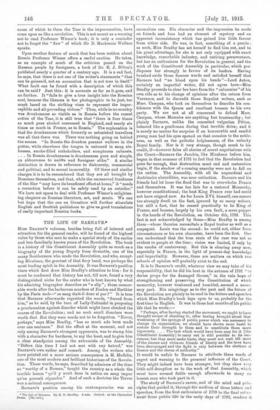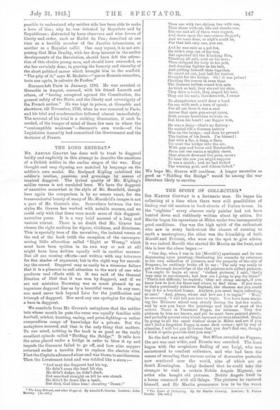THE LIFE OF BARNAVE.*
Miss BRADBY'S volumes, besides being full of interest and attraction for the general reader, will be found of the highest value by those who care to make a special study of the earlier and less familiarly known years of the Revolution. The book is a history of the Constituent Assembly quite as much as a biography of the young Deputy from Grenoble, one of the many Southerners who made the Revolution, and who, except- ing Mirabeau, the greatest of that fiery band, was perhaps the most leading spirit in the Assembly. It was Barnave's position there which first drew Miss Bradby's attention to him: for it must be confessed that history has not, till now, found a very distinguished niche for the orator who is best known by what his admiring biographer describes as "a slip"; those memor- able words after the barbarous murders of Foulon and Berthier by the Paris mob—" ce sang etait-il done si purr It is true that Barnave afterwards regretted the words, "forced from him," as he said, by the tone of Lally-Tollendal in proposing a proclamation against disorder which might have checked the course of the Revolution; and no such small disasters were worth that. But they were words not to be forgotten. "Never, perhaps," says Miss Bradby, "has so much ado been made over one sentence." But the effect at the moment, and not only among Barnave's strongest opponents, was to stamp him with a character for hardness, to say the least, and to give him a clear standpoint among the extremists of the Assembly. "Before this time I had not met with any hatred," was Barnave's own rather naïf remark. Among the writers who have pointed out a more serious consequence is M. Madelin, one of the most modern and brilliant historians of the Revolu- tion. Those words, he says, described by admirers of the time as "worthy of a Roman," taught the country as a whole the
terrible lesson " y avait dans la nation un sang impur qu'on pouvait repandre." And of such a doctrine the Terror was a natural consequence.
Barnave's position among his contemporaries was an
•
Tho Lift of Barnavo. By B. D. Bradby. 2 vols. Oxford at the Olareudeu Press. [188. not.]
anomalous one. His character and the impression he made on friends and foes had an element of mystery and au apparent inconsistency which has gained him little favour from either side. He was, in fact, something of a puzzle : as such, Miss Bradby has set herself to find him out, and to his great advantage, for she is not only equipped with exact knowledge, remarkable industry, and untiring perseverance, but has an enthusiasm for the Revolution in general, and the work of the Constituent Assembly in particular, which pro-
disposes her strongly in favour of its leaders. Having brushed aside -those famous words and satisfied herself that Barnave had "no blood upon his hands "—Lord Acton, certainly an impartial writer, did not agree here—Miss
Bradby proceeds to clear her hero from the " calumnies" of his own side as to his change of opinions after the return from Varennes, and to discredit those Royalist writers, such as Mme. Campan, who took on themselves to describe his con- fidences with the Queen and resultant treason to his own party. We are not at all concerned to defend Mme. Campan, whose Memoirs are anything but trustworthy ; but plainly Barnave, unlike the conceited vulgarian Potion, behaved like a gentleman during that terrible drive; and it is surely no matter for surprise if an honourable and candid young man had his eyes opened on that occasion to the noble- ness, as well as the pathetic helplessness, of the unlucky Royal family. Nor is it very strange, though much to his credit, if—however false all stories of secret negotiations with the Court—Barnave the Jacobin, like Mirabeau before him, began in that summer of 1791 to feel that the Revolution had
gone far enough, that destruction must end and restoration begin, if the shadow of a coming anarchy were not to fall on the nation. The Assembly, with all its unpractical and
doctrinaire absurdities, was near extinction. Barnave and his friends had let loose the flood that was to overwhelm France and themselves. It was too late for a restored Monarchy, however constitutional; the best King France ever had could not have reigned now. As for Louis XVI. himself, one cannot too strongly dwell on the fact, ignored by so many writers, but still a fact, that he ceased practically to be King of
France, and became, largely by his own fault, a mere puppet in the hands of the Revolution, on October 6th, 1789. This
fact is not acknowledged by those—Miss Bradby is among them—whose theories necessitate a Royal traitor as well as a scapegoat. Louis was the second: he could not, either from circumstances or his own character, have been the first. One can understand that the true state of the case was not so evident to people at the time ; vision was limited, if only by the smoke of controversy. But this is clearing away now, especially in France, in the light of present-day knowledge and impartiality. However, these are matters on which two schools of opinion will probably exist to the end.
It is to Barnave's credit, whatever view we may take of his responsibility, that he did his best in the autumn of 1791 " to devise props for the damaged throne," in the vain hope of strengthening and preserving the Constitution of which monarchy, however weakened and humbled, seemed a neces- sary part. His misgivings as to the past and the future of the Revolution are plainly to be read in the letters and speeches which Miss Bradby's book lays open to us, probably for the first time in English. It was in those last months of his public
life that be wrote:— "Perhaps, after having started the movement, we ought to have thought sooner of checking it ; after having brought about that weakening of the springs of public power which was necessary to change its organization, we should have shown more haste to restore their strength to them and to constitute them more vigorously. . . . The task which would have been easy for it [the Constituent Assembly] to carry out is still possible to its suc- cessors, but they must make haste, they must not wait till most of the sincere and virtuous friends of liberty and the laws have been discouraged and the fight is only between the abettors of licence and the slaves of authority."
It would be unfair to Barnave to attribute these words of regret and warning to the personal influence of the Court. They might indeed have been stronger, but they show very little self-deception as to the work of that Assembly, which must have seemed futile enough afterwards to many an honest man who took part in it.
The study of Barnave's career, and of the mind and prin- ciples that guided it,' through the medium of these letters :n1•li speeches, from the first enthusiasm of 1789 to the final retire- ment- fronr public lift in the -early • days of •1792, renders it possible to understand why neither Bide has been able to make a hero of hiin ; why he was detested by Royalists and by Republicans; distrusted by keen observers and wise lovers of liberty and order, such as Mallet du Pan; described at one time as a terrible member of the Jacobia triumvirate, at another as a Royalist 1:anie. One may repeat, it is not our- prising that Miss Bradhy, with her deep interest in the earlier developments of the Revolution, should have felt the attrac- tion of this elusive young man, and should have succeeded, as she has certainly done, in proving the honesty and sincerity of the short political career which brought him to the scaffold. " The pity of it," says M. Madelin—" qua cc Remain conualtra, trois ans aprbs, le calvaire de Foulon."
Barnave left Paris in January, 1792. He was arrested at Grenoble in August, accused, with his friend Lameth and others, of "having conspired against the Constitution, the general safety of the State, and the liberty and sovereignty of the French nation." He was kept in prison, at Grenoble and elsewhere, till November, 1793, when he was removed to Paris, and his trial and condemnation followed almost immediately. The account of his trial is a striking illustration, if such be needed, of the temper of mind of those few men to whom the "contemptible weakness "—Barnave's own words—of the Legislative Assembly had committed the Government and the destinies of France.



































 Previous page
Previous page